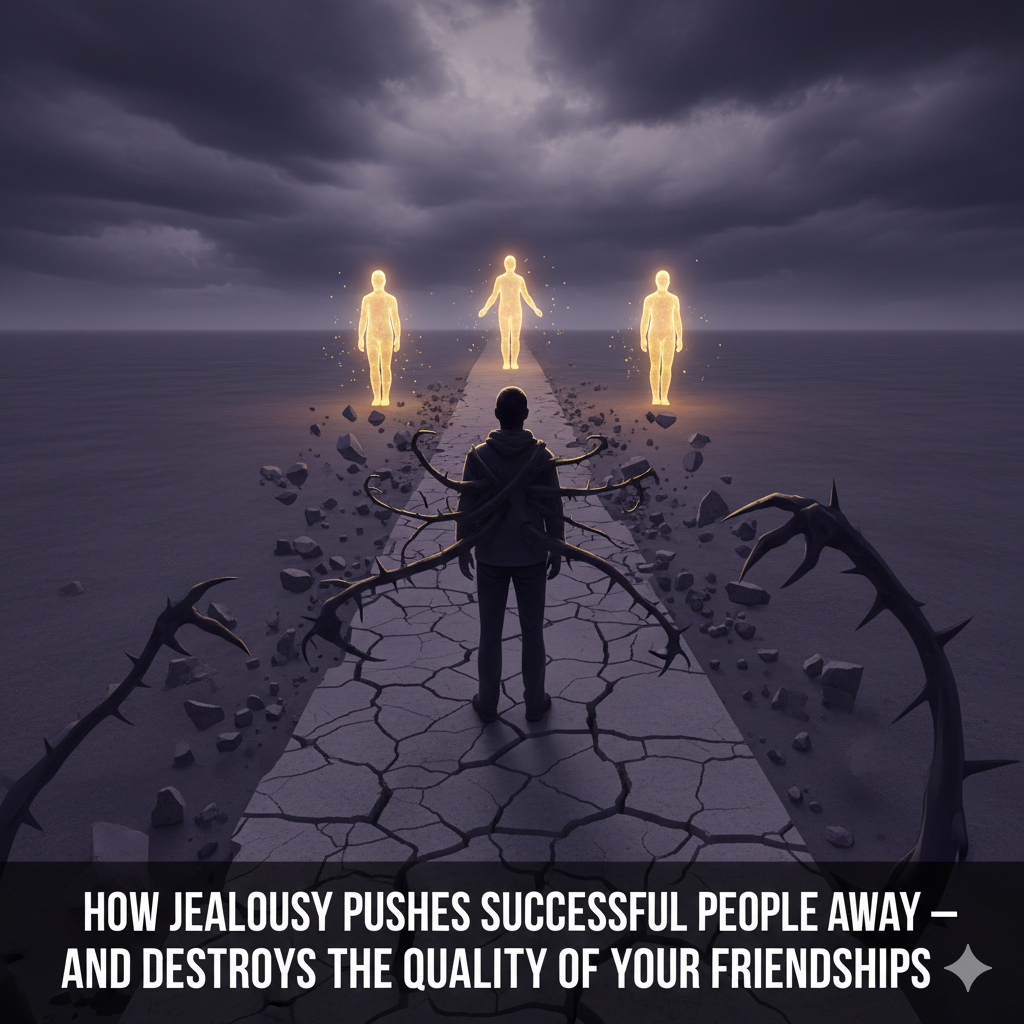Jealousy is one of the most natural emotions in the world — but also one of the most dangerous. It hides in small reactions: the forced smile when a friend succeeds, the silent bitterness when someone gets what you wanted, the subtle need to prove that you’re just as good. Everyone feels it at times, but when jealousy becomes part of your behavior, it quietly poisons your social life.
The harsh truth is that jealousy doesn’t just make you unhappy — it drives away the best people in your life. It turns your relationships toxic, pushes successful and confident people out of your orbit, and leaves you surrounded by mediocrity. Over time, you don’t just lose friends — you lose access to growth, opportunity, and wisdom.
1. Jealousy Is Energy That Repels Success
People who are building something — whether it’s wealth, discipline, or happiness — are drawn to positivity. They feed on environments that encourage ambition, creativity, and forward motion.
When they sense jealousy, they sense resistance. They feel the invisible tension that says, “I don’t want you to do well unless I do better.” No matter how polite the words are, that energy cannot be hidden.
Jealousy is a repellent. It’s like static interference in a frequency of growth. People who are leveling up in life don’t want to feel judged for it. They want to be around others who are inspired by success, not threatened by it.If every time someone you know improves, you feel pain instead of motivation, you become emotionally expensive to be around. People will tolerate you for a while — then slowly drift away.
2. Successful People Sense Jealousy Instinctively
You don’t have to say, “I’m jealous.” People can feel it.It shows in your tone when you downplay their wins.It shows when you change the topic after they share good news.It shows when your compliments sound like competition.Successful people have dealt with jealousy countless times. They’ve seen “friends” turn cold the moment things go well. They know what fake support feels like. So, the moment they detect that subtle shift — that unspoken resentment — they quietly distance themselves.They won’t argue or call you out. They’ll just stop inviting you. They’ll share less. And one day, you’ll realize they’ve completely disappeared from your circle.
3. Jealousy Reveals Insecurity, Not Awareness
Some people justify their jealousy as “motivation” — but true motivation doesn’t come from envy. It comes from vision.When you envy someone, you’re not focused on what they did right. You’re focused on why you don’t have it. That mindset turns your energy inward, into resentment and self-doubt.Jealousy says:> “If they win, I lose.”
Confidence says:> “If they win, it means winning is possible.”The difference between those two mindsets determines who stays in your life. Confident, successful people surround themselves with others who celebrate progress. They don’t have time to be therapists for bitter friends who measure everything as a competition.When you show jealousy, you’re not signaling that you want more from life — you’re signaling that you lack emotional control. And nothing makes high-quality people leave faster than emotional instability.
4. Jealousy Lowers Your Circle’s Quality Over Time
Here’s what happens when jealousy becomes your default response: you push out everyone who’s doing better than you.The ambitious leave. The hardworking leave. The dreamers leave.What’s left are the people who make you feel comfortable — the ones who aren’t growing, the ones who complain instead of build, the ones who secretly enjoy tearing others down.That’s how jealousy traps you. You surround yourself with people who feed it instead of challenge it. Suddenly, your conversations revolve around gossip, resentment, and excuses instead of ideas, strategy, and growth.Your “average friend” becomes someone who’s just as stuck as you. You stop learning from others, and your potential begins to shrink to the size of your social circle.Jealousy doesn’t just isolate you — it lowers your entire environment.
5. Growth Feeds on Admiration, Not Envy
Think about the people who improved your life the most. Maybe they were mentors, business partners, or friends who inspired you. You learned from them because you admired them.Admiration opens the door to growth. It says:> “Teach me what you know. I want to rise too.”Jealousy closes that door. It says:> “I don’t want to learn — I just want to catch up.”The moment you feel jealous of someone, you stop being able to learn from them. Instead of observing what they’re doing right, you waste time looking for reasons to believe they got lucky.That mental block keeps you poor, bitter, and stuck — while the people you envy keep advancing.
6. Jealousy Comes From Comparison — and Comparison Comes From Weak Focus
The root of jealousy is comparison. And comparison is a symptom of lost direction.When you’re focused on your own path, you don’t have the energy to compare. You’re too busy working on your goals to care about someone else’s timeline. But when you stop building, your mind starts wandering. You start asking, “Why not me?”The cure for jealousy isn’t pretending it doesn’t exist — it’s redirecting the energy. Every time you feel jealousy, use it as a signal: “This is something I want. I should learn how to get it.”
Turn comparison into curiosity. Ask:
What did they do differently?
What skill or risk did they take that I haven’t?How can I use this as inspiration instead of resentment?
That mindset shift transforms jealousy from poison into fuel.
7. Gratitude Protects You from Jealousy
You can’t be truly grateful and deeply jealous at the same time. The two emotions cancel each other out.Gratitude reminds you that your path is unique. It teaches you to appreciate the progress you’ve already made and trust that more is coming.When you genuinely appreciate your current life — your health, your work, your potential — other people’s success stops feeling like a threat. It becomes proof that good things are possible.The more gratitude you practice, the less jealousy controls you. And as your inner peace grows, so does the quality of people you attract.
8. High-Quality People Want Peace, Not Drama
Successful people aren’t just financially rich — they’re emotionally disciplined. They’ve learned that drama destroys productivity, and they avoid it at all costs.Jealous friends bring emotional chaos. Every victory turns into a delicate balancing act — “Will they be upset if I share this?” — and every conversation becomes emotionally draining.
That’s why high-quality people cut jealousy out early. They know it only takes one jealous person to poison a room.
If you want to keep good people in your life, become someone who adds calm, not tension. Celebrate others’ success genuinely. Compliment freely. Ask questions instead of competing. The peace you give off will attract winners who actually want you around.
9. Jealousy Makes You Miss Opportunities
When you envy someone, you close yourself off to collaboration. Instead of thinking, “How can I learn from this person?” you think, “How can I prove I’m better?”That attitude kills opportunity. You could have built partnerships, shared ideas, or created something together — but your ego got in the way.In the business world, jealous people stay broke because they burn bridges. In friendships, they stay lonely because they treat every success story as a threat.Every moment you spend being jealous is a moment you could have spent improving yourself.
The Cure for Jealousy Is Self-Mastery
Jealousy fades when you become deeply focused on your own mission. The more purpose you build, the less you care about comparison.
People who are obsessed with growth don’t have time to resent others — they’re too busy becoming their future selves.
When you shift from competition to creation, jealousy loses its power. You start attracting people who are equally driven, supportive, and growth-oriented. Your average friend becomes someone who inspires you — not someone who drags you down.
Jealousy is the emotional tax you pay for not focusing on yourself. It’s the reason why talented people lose friends, why relationships sour, and why so many ambitious people end up surrounded by mediocrity.
If you want a high-quality circle, you have to become a high-quality person — one who celebrates success, not resents it.The moment you stop competing with others and start competing with your past self, you’ll notice something remarkable:the jealousy fades, the good people return, and your life starts moving forward again.
Because success doesn’t thrive in bitterness — it thrives in gratitude, confidence, and peace.


